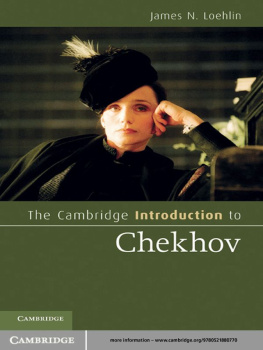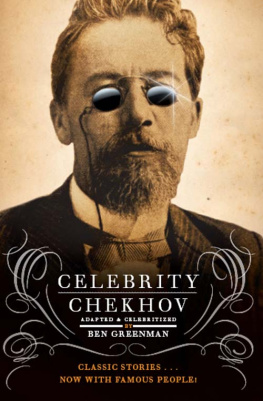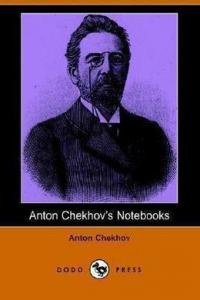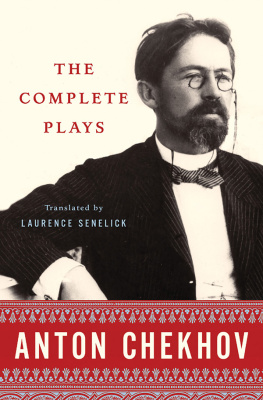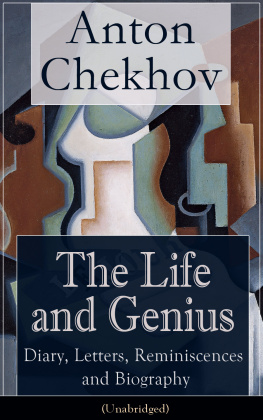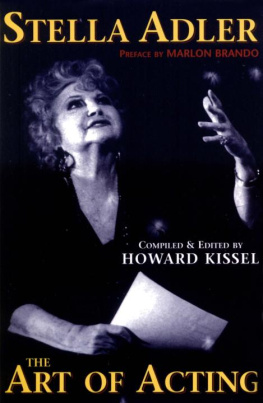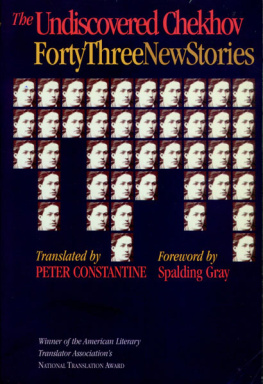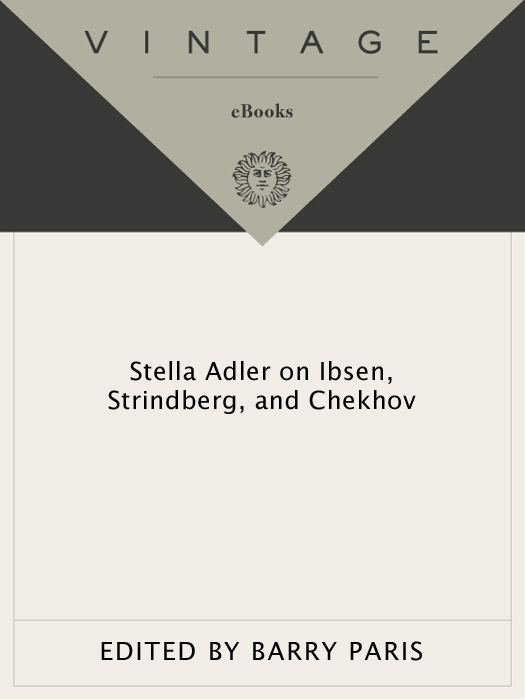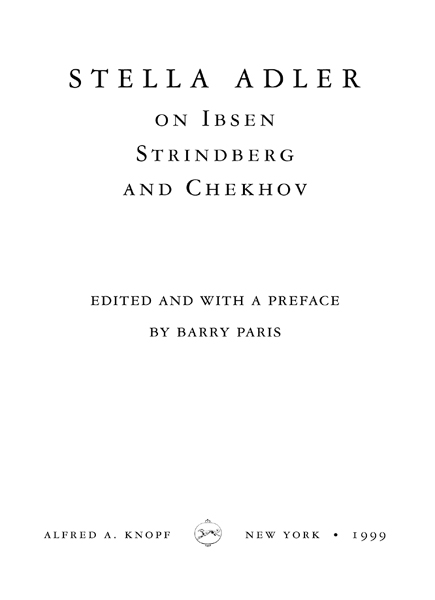ALSO BY STELLA ADLER
Technique of Acting
THIS IS A BORZOI BOOK
PUBLISHED BY ALFRED A. KNOPF, INC.
Copyright 1999 by The Estate of Stella Adler
Preface 1999 by Alfred A. Knopf, Inc.
All rights reserved under International and Pan-American Copyright Conventions. Published in the United States by Alfred A. Knopf, Inc., New York, and simultaneously in Canada by Random House of Canada Limited, Toronto. Distributed by Random House, Inc., New York.
www.randomhouse.com
Knopf, Borzoi Books, and the colophon are registered trademarks of Random House, Inc.
A portion of this work was originally published in
The Yale Review.
Library of Congress Cataloging-in-Publication Data
Adler, Stella.
Stella Adler on Ibsen, Strindberg, and Chekhov / by Stella Adler : edited by Barry Paris.1st ed.
p. cm.
eISBN: 978-0-307-78793-4
1. DramaExplication. 2. Ibsen, Henrik, 18281906Criticism and interpretation.
3. Strindberg, August, 18491912Criticism and interpretation. 4. Chekhov, Anton Pavlovich,
18601904Criticism and interpretation.
I. Paris, Barry. II. Title.
PN1707.A34 1999
809.2034dc21 98-38190
v3.1
C ONTENTS
P REFACE
M Y INTRODUCTION to Stella Adler took place on the perfect California afternoon of October 15, 1992, at her home in Beverly Hills. I was received by the grand lady, grandly reclining on a chaise. She was stunningly beautiful at ninety, with the unlined features of a woman half that age, wearing an elegant pink dressing gown topped by a dramatic pink turban.
Adler means eagle in German, and Stellas eyes lived up to the surname. I was there to explore how we might craft a book out of her legendary lectures on theater, and the beguiling smile she bestowed on me did not conceal her real agenda: this was an audition to see if she liked me and thought we could work together. Throughout the initial pleasantries, those eyes bored into and unnerved me. I had never felt so intensely scrutinized and, in self-defense, I got down to business quickly.
Among her voluminous files from a lifetime of teaching were some three thousand pages of transcribed lectures, from the seventies and early eighties, on script analysis as applied to the works of a dozen great modern playwrights. These were the transcripts I was to work with, but there was no way to include them all in one or even two books. The problem would lie in the selection: Ibsen, Strindberg, Shaw, Williams, ONeillwhich ones?
In your choice lies your talent, Adler often said.
My talents lay in film and Slavic languages and were very modest in the realm of theater. Years earlier, I had translated Chekhovs Three Sisters and Griboyedovs Woe from Wit. That was about it. For want of a better way to broach the subject, I made a blatant effort to impress her with my Russian. When she responded with enthusiastic fluency, I asked if she agreed that Chekhov should be one of our leading candidates.
He would be, if you and I thought he was, she replied. I think Chekhov is most wanted in terms of performance. I analyzed it, pulled it apart, got to the core of what he was. Chekhov. I think its a good choice, because hes misunderstood. Hes the most interesting and most wanting to be understood.
Her democratic, clear-minded approach was striking. She spoke eloquently and at length about Chekhov and of her exposure to the great Russian literature that permeated the work of her parents, Jacob and Sara Adler, in the Yiddish theater. No curtain in New York goes up without an Adler behind it, people said. In 1939, when Sara celebrated her fiftieth anniversary on stage, there were no fewer than fourteen Adlers active in the theater, including every member of her immediate family. Stella, the youngest daughter, made her debut in 1906, at the age of four, in Jacobs production of Broken Hearts at the Grand Street Theater in New York. By the midtwenties she had performed in more than one hundred plays there and elsewhere.
Im so delighted that I come from a family where my parents spoke Yiddish, with all the idioms and aspects of that milieu. My mother played in the theater in Moscow. My father loved the Russian language so much. Russian thinking and feeling was a big thing in my life. The enormous talent. Im astonished at the output of Russian music, literatureso unbelievably big. Ive been reading a great deal of Tolstoy lately.
The Yiddish theater was not what most people think it was. It was more. The plays were so formidable. I saw them all. Such a pleasure. Im so familiar with it. Nekhlyudov in Tolstoys Resurrection is mine! I know how he dresses, how he walks, how he feels. Damn it all, what a play! My parents brought the greatest literature of the theater to a Yiddish-speaking audience. The names of Jacob and Sara Adler will stay alive forever for their contribution.
After Stella left the Yiddish theater, she found that Broadway and the world of mainstream drama were quite chilly toward Jewish namesokay for character actors, maybe, but not leading ladies. Later, in Hollywood, she would star in a Paramount comedy called Love on Toast as Stella Ardler, based on the studio brains notion that the r made her surname more Gentile. She switched back to the original immediately afterward, refusing (like her brother Luther) to turn her back on her heritage.
When they interviewed me on television in London, my opening line was, Im a Jewish broad from Odessa. Im deeply understanding of being a Jewish child, a Jewish woman, which has given me my talent and my standards. My parents and grandparents came from Odessa. I am so proud of it!
She paused to catch her breath. The energy and passion of her testimonial were infectious. Id been respectfully silent for a long time. Now seemed the time to take advantage of her pause and play the trump card of my credentials. Guess what? I said cheerily. My grandparents were Jews from Odessa, too.
Suddenly, the big eyes that hadnt left mine got bigger and watery. Her benign conversational smile vanished. She held out her hand in the traffic cops firm palm-up signal of Halt! What the hell had I said? I was riveted with alarm to that dramatic hand in the dramatic pause before her dramatic whisper:
Stopdont make me cry!
I replayed it many times on my tape recorder and in my mind, wondering if the tragic tone was real or theatrical, before figuring out it was a precisely equal combination of both. Alone with an audience of one or onstage before hundreds, Stella Adler gave the same performance: Emotion was something felt, not faked. Real and theatrical must be the same.
This book is the brainchild of Victoria Wilson, my close friend and editor at Knopf. She is the daughter of author Mitchell Wilson. At eighteen she became Stellas stepdaughter when her father married Adler. So there were multiple personal and artistic reasons for the three of us to undertake this massive projectnot least that it would be a delightful lot of fun. But to whom, exactly, would the book be aimed? Stellas answer:
Its for actors. Its for directors. Its for other people. Its for readers. An awful lot of theater people want to know and understand, dont you think?
We would aim for a general and theatrical audience alike, limiting the student-teacher exchanges in her lecture transcripts to a few of the best and confining most professional exercises to the last chapter, tailoring them so thatalthough primarily for actors and directorsthey might interest nontheater people, too. We would do it in two volumes: the first devoted to three great European playwrights, the second to three Americans. For now, we would worry only about volume one and the Europeans. There was no doubt about Chekhov. But which other two?


